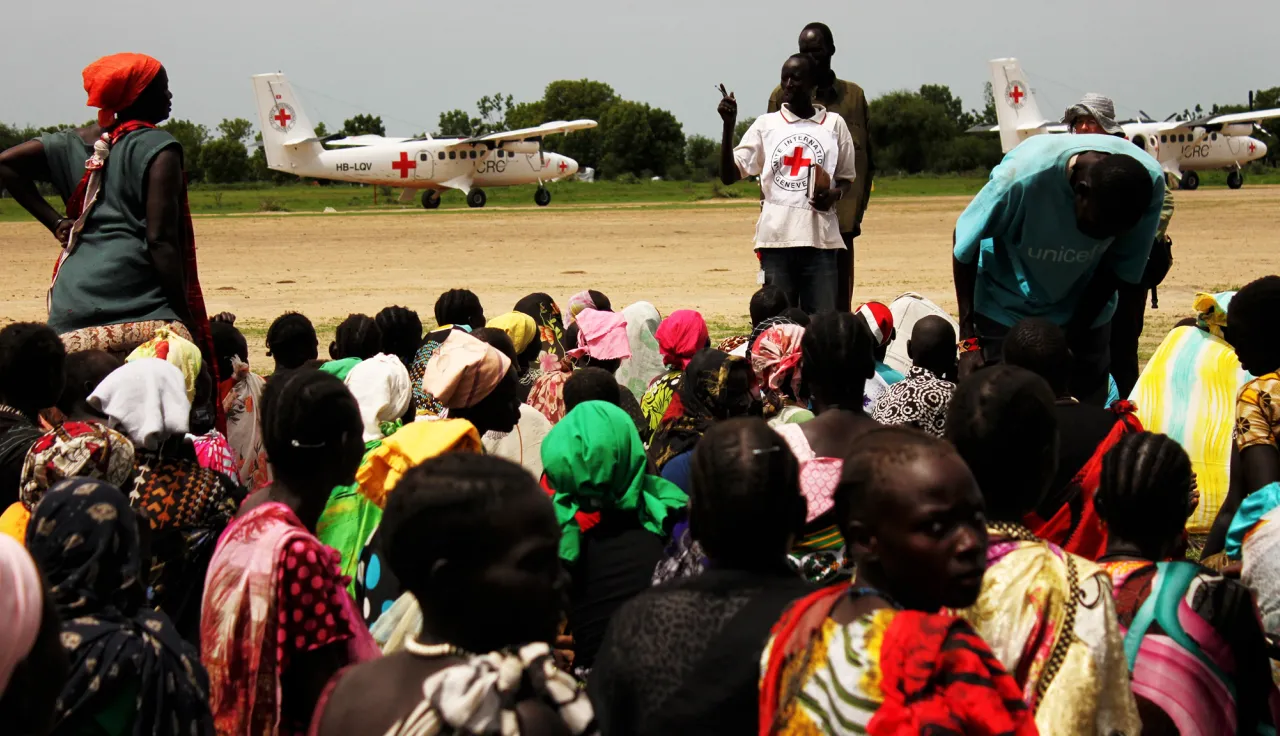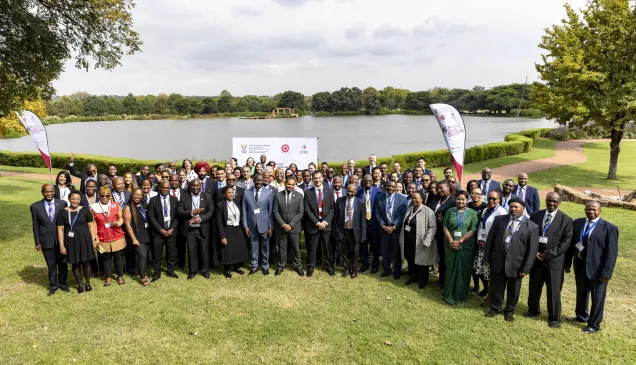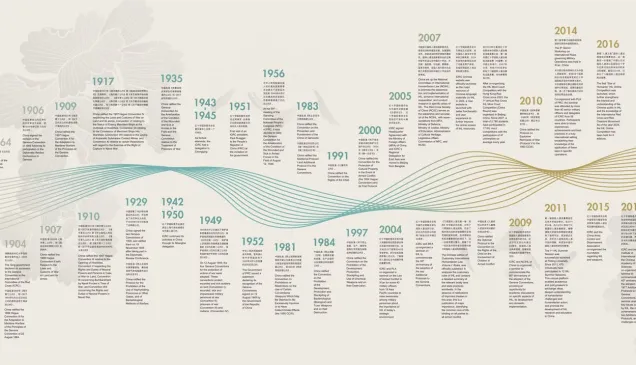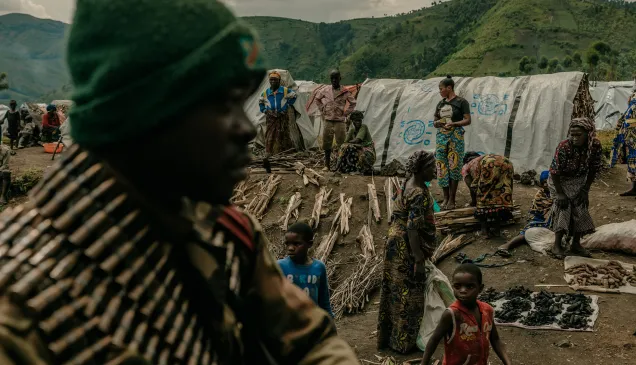Volatile environment and humanitarian needs on the rise in Unity and Upper Nile states

South Sudan: Facts and figures September 2015 - A summary of the ICRC's activities in South Sudan since the beginning of the emergency in mid-December 2013 to the end of August 2015.
As a result of the recent wave of violence in Unity and Upper Nile, thousands of people have fled their homes in the last few months, seeking safety in the bush and swamps in remote areas where there is little or no food and even less access to health care. Furthermore, lack of security and harsh weather conditions further complicate access to vulnerable populations.
"Sadly, the situation in Unity continues to deteriorate - In Leer, and parts of Koch and Mayendit counties, the population has largely exhausted its traditional coping mechanisms" said Daniel Littlejohn, Head of the ICRC sub delegation in Unity state. "Properties, crops, cattle and other forms of sustenance have been lost or destroyed. There is no regular access to healthcare and with this constant instability, the opportunities to provide relief are very limited".
Until May this year, the ICRC ran a large relief operation out of its base in Leer, distributing food aid for more than 100,000 persons on a regular basis and providing surgical care to war wounded. As the fighting in May intensified, the ICRC evacuated its staff to safer locations. However, despite the insecurity, the ICRC has delivered assistance to conflict-affected families in Leer, Mayendit, and Mayom counties since July. Over 40 000 people have received some combination of food rations and essential living items, including fishing kits, mosquito nets and sleeping mats. In addition, over 100 wounded people have been transported by the ICRC to hospitals to receive critical surgical care.
Many of the displaced have lost everything they own during their flight and the ICRC has been able to provide emergency assistance to those who arrived in Toch and Nyadin in Jonglei state. "I left Bentiu in May and moved with my wife and children to Old Fangak, because of the fighting. It took us five days to reach this place by canoe" said Magok Yut, a 32 year old who received food rations and a fishing kit from ICRC in Toch, during the most recent assistance operation.
Similarly in Upper Nile, displacements continue unabated, further exacerbating the dire humanitarian situation. Tensions between the West and the East banks of the Nile since April this year, led to many inhabitants from Bienythiang, Riang and Rom payams to flee inland, mainly into Akoka town, while on the opposite bank of the river, residents of the town of Kodok similarly moved away from the Nile, for security reasons. The ICRC estimates that many suffer from shortage of food, a critical economic situation and a host community simply unable to accommodate the needs of the displaced. In response to the situation, by end of August, the ICRC managed to provide food rations and seeds to over 53,000 people in the area.
Last month, the ICRC also established a temporary base in Oriny (Upper Nile state) providing primary health care services in the local medical clinic and outreach to the County Hospital in Kodok, which was caught in the crossfire early July. Since this incident, the ICRC had to reduce its services to the community. Both in Unity and in Upper Nile, the ICRC has been continuously evacuating critically injured patients from near the frontlines for surgery and further treatment in Juba, Waat, Old Fangak and Maiwut. In the last 4 months, 224 people have been transported into medical facilities for medical care.
Across the country, people have been greatly affected by almost 20 months of conflict which has created deep and long lasting humanitarian consequences. The ICRC will continue to provide emergency assistance to the affected populations and will monitor the situation, as it evolves, continuously adapting its response to the needs on the ground. South Sudan remains the ICRC's largest operation on the African continent.
Figures
Since the beginning of the conflict in December 2013, the ICRC has carried out the following activities:
In the area of health our medical and surgical teams have:
- Performed nearly 6500 surgeries in local health facilities;
- Assisted 3,500 people with disabilities in three physical rehabilitation centres
- Conducted nearly 35,000 outpatient consultations and provided antenatal care for more than 2,600 women, safe deliveries for 208 women and administered more than 3,600 vaccine doses to children under 1 year old.
- Provided medical materials to 54 first-aid and other healthcare facilities. The South Sudan Red Cross teams complemented this work by assisting patients with nearly 21,000 dressings.
- Trained 324 weapon bearers, police and fire fighters in basic first aid with focus on safe access to health care.
- Conducted sensitization sessions on sexual violence for nearly 100 health staff in medical facilities supported by ICRC in Waat, Motot, Kodok, and Maiwut.
- Trained midwives from the Ministry of Health as trainers in clinical care of sexual assault survivors
To assist displaced people and other populations affected by the conflict, the ICRC, together with the South Sudan Red Cross, has:
- Distributed more than 1,260, 000 monthly food rations in Lakes, Unity, Upper Nile, Warrap, Jonglei, Northern and Western Bahr el Ghazal, Western and Central Equatoria states, benefiting over 150,000 people on a regular basis;
- Provided household essentials for nearly 570,000 people across the country,
- Ensured access to safe drinking water for over 437,000 residents and displaced people through the rehabilitation of 444 water infrastructures such as hand pumps and water yards in conflict affected areas including Jonglei, Upper Nile, Unity, Greater Equatoria and Greater Bahr el Ghazal;\
- Built sanitation facilities for 23,600 people in Mingkaman and Fashoda County and installed emergency water treatment units in Torit, Lul and Kodok for further 120,000 to increase access to sanitation and limit the risk of outbreaks of water borne diseases such as cholera.
To help build the resilience of communities and cope with serious food insecurity, the ICRC has:
- Provided nearly 677,000 people with seeds and tools for farming activities, and more than 190,500 with fishing kits;
- Vaccinated 777,000 heads of livestock and treated over 128,000 animals, benefitting 362,000 people in Northern Bahr el Ghazal, Lakes, Upper Nile, Unity, Jonglei, and Central Equatoria states;
- Trained 363 Community Animal Health Workers and equipped 276 with drugs and working tools.
Through visits to places of detention, the ICRC supports the detaining authorities to adhere to international standards:
- Visited more than 9,600 people in various places of detention;
- Improved living conditions of over 1,000 detainees in Juba, Aweil, and Wau Central Prisons through rehabilitation works
- Ensured improved access to health for more than 2,300 detainees trough interventions in response to cholera and scabies outbreaks in 2015 in Juba, Rumbek and Wau Central Prisons
To help reconnect family members separated by the violence, the ICRC and SSRC have:
- Facilitated nearly 26,000 successful phone calls between family members and distributed more than 3,700 Red Cross messages to exchange family news;
- Registered 124 unaccompanied children within South Sudan;
- Reunited more than 80 children and vulnerable people with their families.
To promote knowledge and respect for international humanitarian law, the ICRC has:
- Delivered training and dissemination sessions to nearly 2,800 weapon bearers including members of the armed forces and armed groups.



